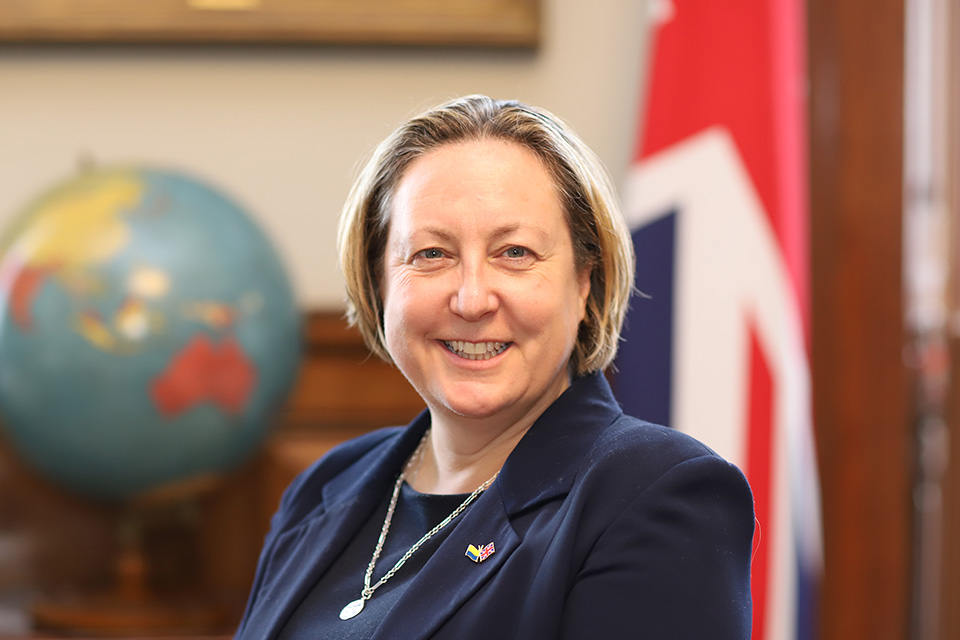Agriculture Breakthrough Ministerial Meeting: Minister Trevelyan’s speech in Washington D.C.
Minister Anne-Marie Trevelyan's speech at the Agriculture Breakthrough Ministerial Meeting in Washington D.C.

Thank you, Juan-Lucas, and welcome friends, colleagues and our Breakthrough co-lead, Egypt. I want to thank our hosts, and offer congratulations to the USA and UAE for their global leadership on AIM for Climate, which has spurred on a wonderful group of partners in this race we are all in to innovate for a more resilient and sustainable food system.
Because as we meet, our food systems continue to be rocked by the effects of the climate crisis and armed conflicts, including Russia’s illegal invasion of Ukraine. A cruel act, which has also caused turmoil in food, fertiliser and fuel markets, triggering economic instability and plunging millions into food insecurity. This turmoil has contributed to increasing the number of food-insecure people around the world, currently standing at nearly 350 million people.
And yet, instability is only one of the risks that we face. Climate change and the steady erosion of our ecosystems pose a continuing severe threat. And agriculture itself is the second largest producer of greenhouse gas emissions, the primary cause of biodiversity loss, and the leading driver of deforestation.
So innovation has never been more urgent. With a lot of research and a little ingenuity, we can rise to the challenge. Scientific and technological advances over the last fifty years have allowed the world to make huge strides in tackling global hunger. The science of the Green Revolution increased GDP per capita in the lowest income countries by 20% by 2010. And modern crop varieties alone avert as many as 6 million infant deaths each year.
But as we confront the triple challenge of climate change, biodiversity loss and food insecurity, we need a new revolution – a truly green revolution, founded on innovation, that can deliver food security for all.
Fertilisers, for example, were highlighted as a priority in last year’s Breakthrough Agenda Report. From February to April last year, global fertiliser index prices rose by 30%, severely testing supply chains already buffeted by the pandemic. The highest global fertiliser prices since 2008, only piled on the pressure.
So that’s why I am pleased to announce today that the UK is joining the Global Fertiliser Challenge and will commit £3 million to a new research consortium, together with the USA and the Foundation for Food and Agriculture Research. The Efficient Fertiliser Consortium will be dedicated to the development and testing of novel fertiliser products with the potential to transform productivity around the world, while safeguarding the natural resources on which we all depend.
So we invite others here, to join us in supporting this critical new research. We need everyone’s engagement, because innovation alone is not enough.
We need to get better at putting technologies to use, at scale. Too often, transformative ideas sit on the shelf, because market, policy, or investment barriers stand in the way of farmers’ access to them. And this is where the Agriculture Breakthrough comes in.
The Agriculture Breakthrough, which we launched during the UK’s COP26 Presidency, aims to “make climate-resilient and sustainable agriculture the most attractive and widely-adopted option for farmers everywhere by 2030”.
So at the heart of the agenda is international collaboration: the idea that, together, we can overcome those barriers that block widespread adoption of sustainable solutions:
From cutting-edge solar irrigation, which can transform the productivity of smallholder farmers in Africa, to climate resilient crops, such as the Vitamin A sweet potato which is nourishing millions, to promoting crop diversity by intercropping with beans and pulses which build soil health, to investing in cutting edge AI, predictive modelling and big data to extend credit to smallholder farmers, transform their productivity and enable them to grow more whilst avoiding land expansion and protecting those precious natural resources.
The opportunity is huge; agricultural innovation can unlock growth worth an additional $1.7 trillion to GDP in the Global South, and indeed could reduce global food prices by 16%.
At COP27, we welcomed thirteen new countries to the Breakthrough. But it is still young and we will hear from some of our newest members joining the group today, and I encourage others to join ahead of COP28 as we take on this enormous challenge together.
This meeting – standing as it does between COP27 and COP28 – is the ideal time for us to take stock and I am looking forward to the Breakthrough Agenda Report authors offering a preview of their findings for 2023. Their analysis will challenge us to do more together to accelerate the adoption of technologies.
Because as governments, we can create the conditions to make this happen. If we don’t, who will? Public support for agriculture is a key source of funding worth around £700 billion a year. There is compelling evidence that increasing the proportion spent on the development and deployment of climate-resilient, sustainable agriculture innovations, could yield substantial gains for the planet, for the economy and for everyone.
I urge you to grasp this opportunity over the coming months, as we all consider the Report’s recommendations and translate them into the Breakthrough action plans that we will set together at COP28.
Thank you.